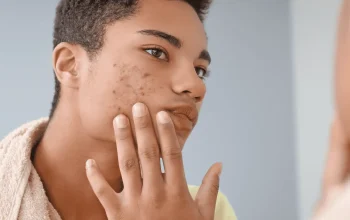Acne has several causes, including bacteria, dead skin cells, and excess oil in the skin. When bacteria get into the oil buildup, they produce an inflammatory reaction. This is where the breakout begins. Acne is caused by many different types of bacteria, including acne-causing p. acnes, and sometimes by fungus, which can cause breakouts. Antifungal therapies can help with fungus outbreaks.
Another common cause of acne is hormones. Hormonal changes during puberty and pregnancy can lead to acne breakouts. In some cases, genetics play a role, too. People who already have acne may develop it more often than others. Also, many people are sensitive to certain substances, such as tight clothing, backpacks, and oily foods. If you think you are prone to acne, it may be a sign of a serious problem.
Stress is another cause. Stress causes acne, and researchers are still researching the role of diet in the development of the condition. Diet plays an important role in acne, but some foods are known to worsen the condition. Eating too much of certain foods can cause acne to worsen. Diets high in fatty foods may also contribute to acne. Fortunately, there are several healthy foods you can eat that can reduce stress and help with acne.
While some people can get rid of acne on their own, others need the help of medical professionals. Topical medications, such as tretinoin, can help you fight the infection. These medicines contain a vitamin A derivative called isotretinoin, which targets all types of acne. Although retinoid is effective, it is not safe for pregnant women or breastfeeding women. If you are trying to get rid of acne, try avoiding all unnecessary cosmetics, including makeup, and try to avoid stress.
Lastly, it is important to avoid excessive alcohol and fatty foods. Excess alcohol in the body can cause acne to flare up, so alcohol consumption should be limited. Aside from alcohol, fatty foods should be avoided as these are the culprits of acne. And if you are prone to severe acne, you should limit your intake of milk. Also, it’s important to wash your hands after sweating to remove bacteria.
Using pore-clogging skincare products can lead to acne. Try using noncomedogenic soaps or unscented cleansers. Try to avoid harsh chemicals in laundry detergent as these can irritate sensitive skin. And remember that psychological stress can affect hormone levels. Stress hormones stimulate the oil glands to produce more testosterone, which clogs pores. Also, medications like lithium and corticosteroids can make acne worse.








